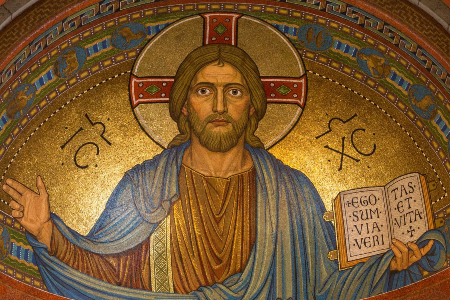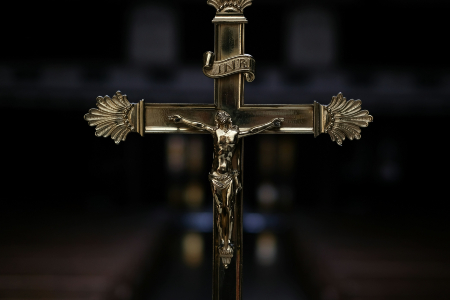We ask you, humbly: don't scroll away.
Hi readers, it seems you use Catholic Online a lot; that's great! It's a little awkward to ask, but we need your help. If you have already donated, we sincerely thank you. We're not salespeople, but we depend on donations averaging $14.76 and fewer than 1% of readers give. If you donate just $5.00, the price of your coffee, Catholic Online School could keep thriving. Thank you.Help Now >
A Strange Anointing
FREE Catholic Classes
If I am to be set apart for service to God, I must also be awash in the anointing oil of suffering.
Highlights
Catholic Online (https://www.catholic.org)
7/15/2009 (1 decade ago)
Published in U.S.
BETHPAGE, TN (Pursuing the Summit)- When God first began teaching me about suffering, I was completely depressed. I had no handle on the glory of suffering, and using those two words in the same sentence seemed, well, stupid, honestly. My analytical mind works at extremes, and I began frantically planning for the worst case scenario, imagining the innumerable excruciating ways one could be "crucified with Christ" (Galatians 2:20).
A Bible geek, it was Revelation 2:8-10 that He used to confront me with my fear, as the church in Smyrna was also in danger of the fear of suffering. Jesus personally encourages them in the midst of severe persecution and poverty. Their works had made them spiritually rich, He said, yet they were about to suffer additional testing by Satan as a result. He adds, "Be faithful unto death, and I will give you the crown of life." In other words, "You're doing great! Now do it until it kills you and I'll reward you!"
These remarks seemed very flippant to me, and were the cause of my fear. Jesus appeared completely oblivious to, or at least unaffected by, their total humiliation and degradation, and I secretly felt I shared Smyrna's experience. Wasn't God always silent and unreachable, asleep-in-the-boat, just when I really needed Him? As conquered as the Christians in Smyrna already were, He never intervened, and they were never visibly rewarded for their remarkable faith.
Instead, they earned new sufferings in the midst of old ones and encouragement to simply take some more. This too, seemed to parallel my own life, and it seemed to me as though God did not really care that we suffer; rather, it was simply expected, and that hurt me, as I experienced some things in my childhood that were still very painful. I expressed this hurt to the Lord, and He answered me with an extraordinary thought.
By God's direction, Old Testament kings and priests were anointed for service with anointing oil, symbolic and indicative of their anointing by the Holy Spirit for special service. The priests were instructed to fling this same oil all over the furniture and instruments in the tabernacle to consecrate, or set aside for special use, everything connected with worshiping God.
This ritual is significant because the presence of the Lord would then descend into the prepared tabernacle. So in a sense, the presence of the Living God, and His servants, were to be anointed with this aromatic oil. Upon penalty of death, the priests were instructed against anointing lay men, making any other like it, or using it for anything else, in order to emphasize the "otherness" of being set aside for God's particular use.
Exodus 30:22-33 gives us the divine formula for the holy anointing oil used in the Old Testament tabernacle. God's specific recipe included scenting by highly skilled perfumers, with balsams, of which a primary ingredient was myrrh. Myrrh was also mixed and used in perfumed oils and lotions that were used on the skin for purification (Esther 2:12). It was outrageously expensive, and so a lavish and precious commodity; but it was also bitter.
In Ruth 1:20-21, Naomi took the new name Mara, similar to myrrh, to designate the "bitterness" of her trials. In Luke 2:34-35 we meet another woman with a name derived from Mara, who experienced unprecedented bitterness. Only the Mother of Jesus could truly understand the irony of this name.
Myrrh appears notably in the New Testament too. Each reference to this plant extract alludes to Jesus either directly or indirectly. At Jesus' birth, the wise men presented Him with treasures of gold, frankincense, and myrrh (Matthew 2:11). While on the cross, Jesus was offered, though He refused it, a mixture of wine and myrrh as an opiate to deaden His excruciating pain (Mark 15:23). After His death, myrrh was included in the embalming spices that prepared his body for burial (John 19:39).
As the presence of God was covered in this strange ointment in the Old Testament tabernacle, seemingly, Jesus too, would be particularly set aside and anointed with this oil, as prophetically designated by the title "The Christ," or, "The Anointed One." Ironically, at each of the three most significant events in Jesus' life myrrh was present, yet it is not spoken of again in the Scriptures until it reappears in reference to the suffering church in Smyrna in the Book of Revelation. The name "Smyrna" means "myrrh."
Myrrh was expensive, fragrant, and bitter, as it was a symbol of suffering and death, and God put it to stunning use in the holy anointing oil in the Old Testament, as if to say "I must be covered in this suffering, as must everything that serves me." The presence of the Father in the tabernacle was awash in the bitterness of suffering; at His quiet birth, the holy Infant was presented with the same prophetic gift; on the bitter cross, holding the eyes of His suffering mother, myrrh appeared; His body, overcome, was bathed in it for burial; and poignantly, the church in Smyrna, in existence through the Holy Spirit, was awash in the holy anointing oil of aromatic suffering and death.
These are the Holy Trinity in the perfect unity of redemptive suffering. Jesus does not diminish, in any way, what we endure. It is so precious, He collects and preserves our tears in a bottle (Psalm 56:8). He is steeped in suffering and identifies with it as the ultimate Suffering Servant. What I was invited to accept, and ultimately to embrace, is that if I am to be set apart for service to God, I must also be awash in the anointing oil of suffering, and that there is often no earthly glory in obedience. It is only for the poor in spirit. "I have said this to you, that in me you may have peace. In the world you will have tribulation; but be of good cheer, I have overcome the world" (John 16:33).
-----
Sonja Corbitt is a Catholic Scripture teacher, study author and speaker. Visit her at www.pursuingthesummit.com and www.pursuingthesummit.blogspot.com.
---
'Help Give every Student and Teacher FREE resources for a world-class Moral Catholic Education'
Copyright 2021 - Distributed by Catholic Online
Join the Movement
When you sign up below, you don't just join an email list - you're joining an entire movement for Free world class Catholic education.
-

-
Mysteries of the Rosary
-
St. Faustina Kowalska
-
Litany of the Blessed Virgin Mary
-
Saint of the Day for Wednesday, Oct 4th, 2023
-
Popular Saints
-
St. Francis of Assisi
-
Bible
-
Female / Women Saints
-
7 Morning Prayers you need to get your day started with God
-
Litany of the Blessed Virgin Mary
Daily Catholic
 Daily Readings for Tuesday, August 13, 2024
Daily Readings for Tuesday, August 13, 2024 St. Hippolytus: Saint of the Day for Tuesday, August 13, 2024
St. Hippolytus: Saint of the Day for Tuesday, August 13, 2024 Prayer for the Forgiveness of Sins: Prayer of the Day for Tuesday, August 13, 2024
Prayer for the Forgiveness of Sins: Prayer of the Day for Tuesday, August 13, 2024- Daily Readings for Monday, August 12, 2024
- St. Michael My: Saint of the Day for Monday, August 12, 2024
- Evening Prayer #1: Prayer of the Day for Monday, August 12, 2024
![]()
Copyright 2024 Catholic Online. All materials contained on this site, whether written, audible or visual are the exclusive property of Catholic Online and are protected under U.S. and International copyright laws, © Copyright 2024 Catholic Online. Any unauthorized use, without prior written consent of Catholic Online is strictly forbidden and prohibited.
Catholic Online is a Project of Your Catholic Voice Foundation, a Not-for-Profit Corporation. Your Catholic Voice Foundation has been granted a recognition of tax exemption under Section 501(c)(3) of the Internal Revenue Code. Federal Tax Identification Number: 81-0596847. Your gift is tax-deductible as allowed by law.








 Daily Readings for Tuesday, August 13, 2024
Daily Readings for Tuesday, August 13, 2024 St. Hippolytus: Saint of the Day for Tuesday, August 13, 2024
St. Hippolytus: Saint of the Day for Tuesday, August 13, 2024 Prayer for the Forgiveness of Sins: Prayer of the Day for Tuesday, August 13, 2024
Prayer for the Forgiveness of Sins: Prayer of the Day for Tuesday, August 13, 2024

